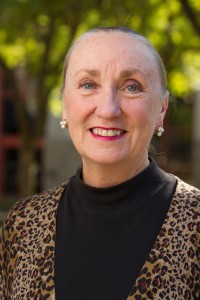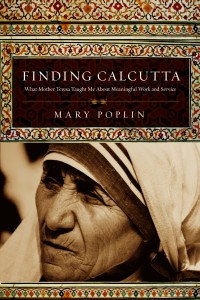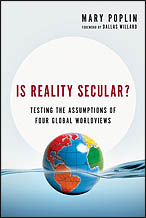
Mary Simpson Poplin, PhD, Professor of Education, School of Educational Studies, Claremont Graduate University, has been (and continues to be) a significant encouragement to and ministry partner with the Emerging Scholars Network. Even before receiving a copy of Is Reality Secular? Testing the Assumptions of Four Global Worldviews (InterVarsity Press, 2014), I knew that it was important to highlight Is Reality Secular? on the blog (See three early posts: 1, 2, 3). Over the course of the past several months, I have had the opportunity to engage Mary in an extended conversation regarding her new publication resulting in a blog series. Thank-you Mary! To God be the glory!
So without further ado, let’s dive in by asking . . .
Tom: Why did you write the book, Is Reality Secular?

Mary: Actually I think I just never stopped writing the Appendix of Finding Calcutta after it went to press in 2008. The editor asked me to add a section to explain where I was in my intellectual crisis at that moment. I resisted at first because it changed the conversation entirely, but it did prompt me to keep writing as I was digging myself out of the hole of “plausible arguments” I had accepted.
So for the next five years I just steadily kept working myself out of this intellectual crisis by trying to better understand the foundations of the worldviews I had believed, lived and taught (material naturalism, secular humanism and pantheism). At the same time I was coming to better understand Christian principles, which, by then, I could see were the best descriptions of truth.
As Christians working in the various areas of the culture we all struggle consciously or unconsciously with the challenges posed by one or more of these worldviews. Since I had lived by these other worldviews until I was 41, I try to explain them both intellectually and culturally; I also knew from personal experience their real consequences. I hoped my struggle might help others.

Tom: Thank-you Mary. For whom did you intend the book?
It may be a big flaw that I try to reach too many audiences, but I was very conscious as I was writing that I wanted the book to engage thoughtful people who are deeply entrenched in the secular world, Christian or not. For Christian faculty and students, we often worry about the more public atheists, but they are rarely the better minds or most influential secular thinkers (or the ones students will confront in college texts). I wanted to use the more respected secular and Christian scholars’ work so any serious thinker could discern more clearly the assumptions, which are often unconscious. Many secularists know very little about Christianity except what the popular media presents, which are primarily caricatures so when I present Christianity I try to be sensitive to the secular mind since I had been among them.
I especially hope the book will help Christian students and seekers in the university who, more often than not, come intellectually ill prepared for college in terms of understanding the principles of Christianity. I wanted them to be prepared for the faulty logic, emotionality, and flawed arguments in the so-called progressive ideologies they will encounter. Even when we sense something is wrong, we have trouble analyzing and articulating exactly what it is. I wanted a book they could use as preparation for the ideas and authors they will read in the university, and to provide them a simple clear framework through which to analyze their lectures and texts. Thus the book is designed to be an easy reference throughout college, where students can look up authors and ideas in the index as they come up in their classes. My hope is the book will be one more little resource for living in and actively influencing our culture without being overtaken by it.
In the next post of the series Mary Poplin gives a brief snapshot of the four global worldviews she writes about in Is Reality Secular? If you desire to hear more of Mary’s story I commend to you Radical Marxist, Radical Womanist, Radical Love — a Veritas Forum at Carnegie Mellon University at which I had the privilege of serving. To God be the glory!
Tom enjoys daily conversations regarding living out the Biblical Story with his wife Theresa and their four girls, around the block, at Elizabethtown Brethren in Christ Church (where he teaches adult electives and co-leads a small group), among healthcare professionals as the Northeast Regional Director for the Christian Medical & Dental Associations (CMDA), and in higher ed as a volunteer with the Emerging Scholars Network (ESN). For a number of years, the Christian Medical Society / CMDA at Penn State College of Medicine was the hub of his ministry with CMDA. Note: Tom served with InterVarsity Christian Fellowship / USA for 20+ years, including 6+ years as the Associate Director of ESN. He has written for the ESN blog from its launch in August 2008. He has studied Biology (B.S.), Higher Education (M.A.), Spiritual Direction (Certificate), Spiritual Formation (M.A.R.), Ministry to Emerging Generations (D.Min.). To God be the glory!

Leave a Reply